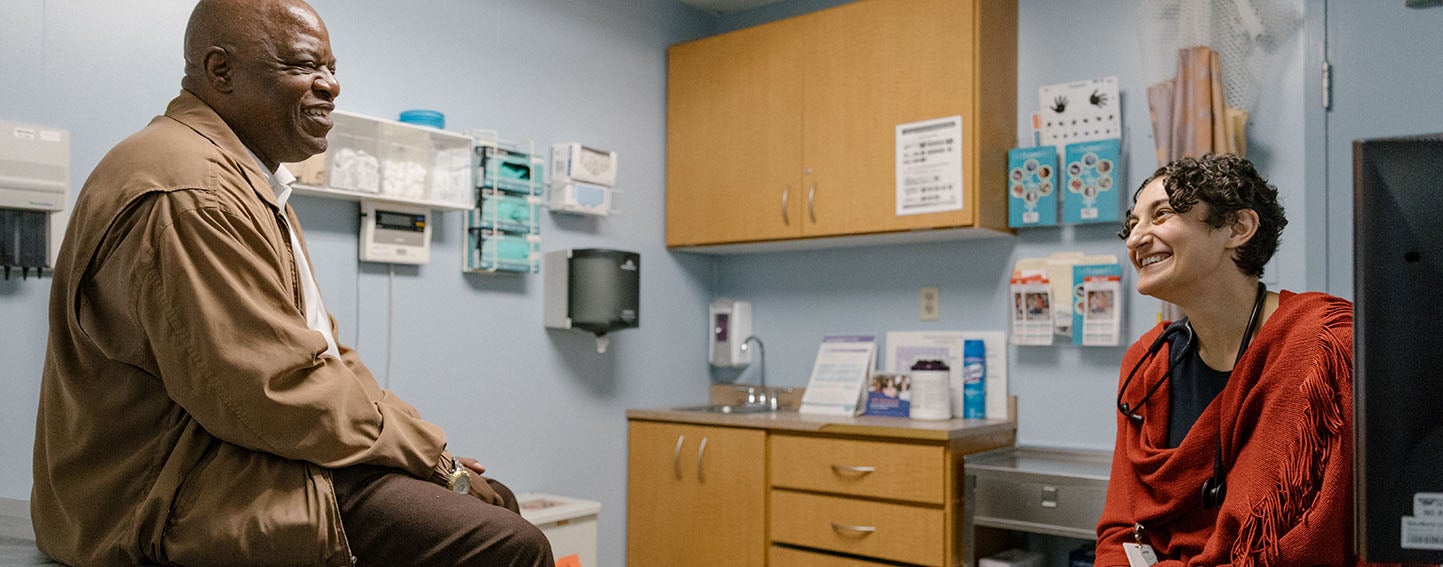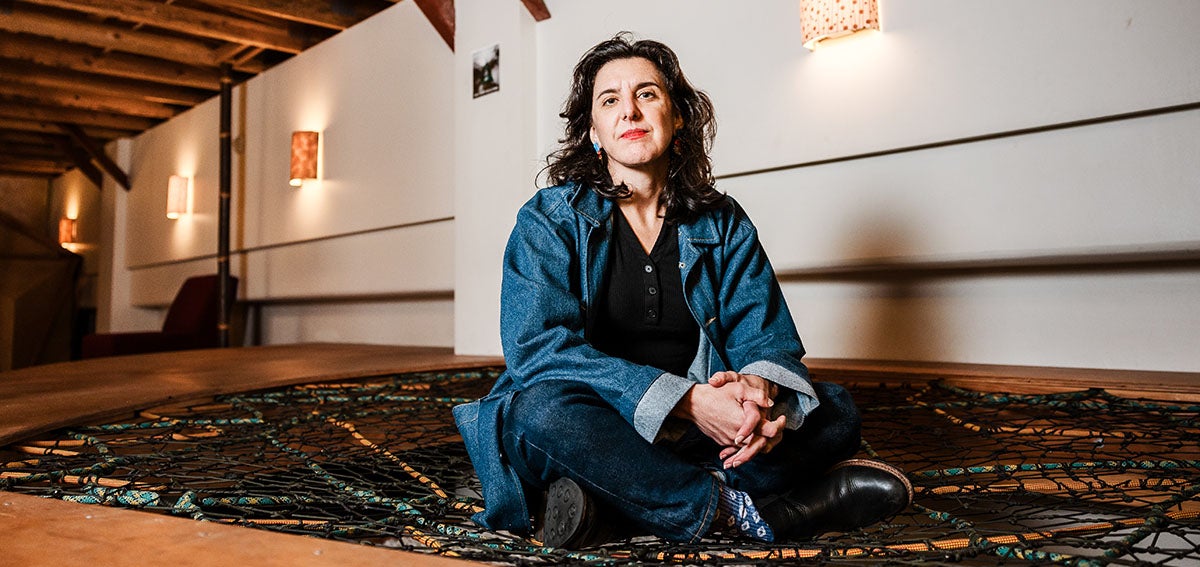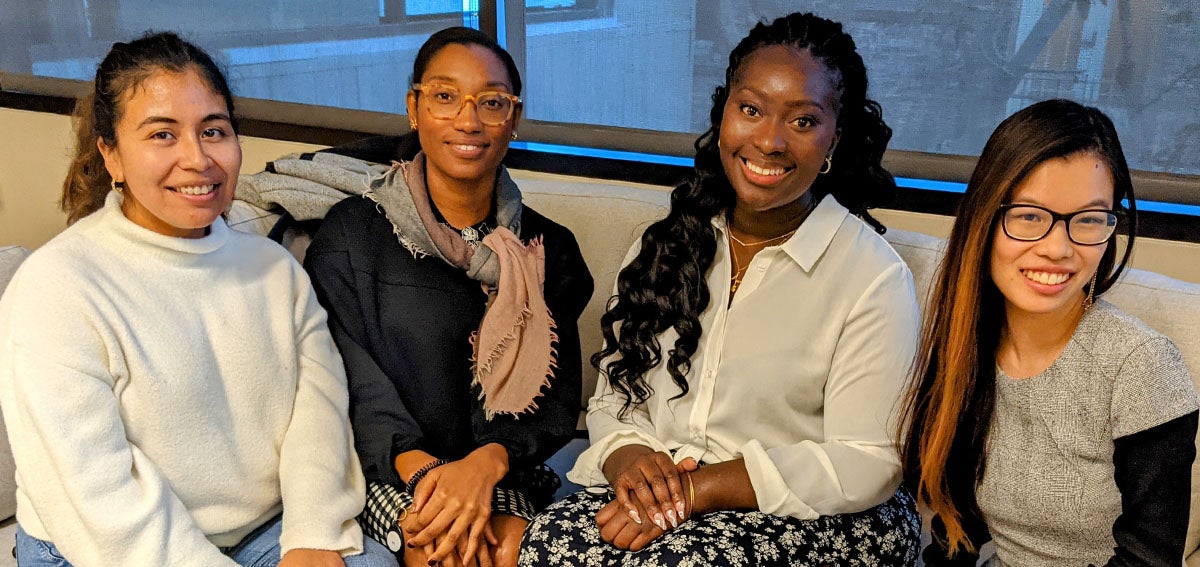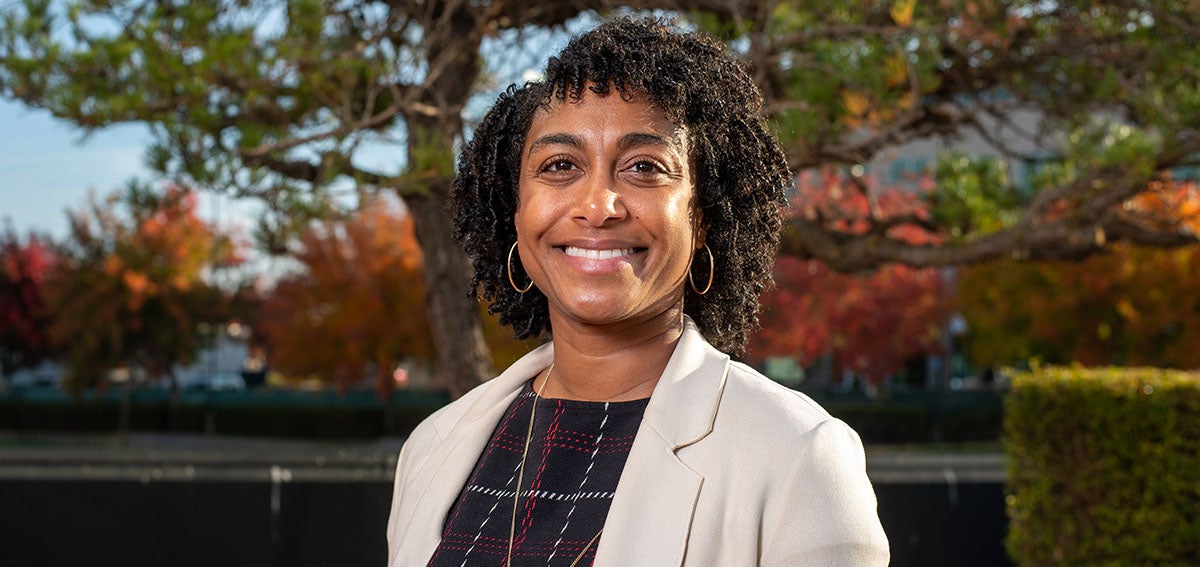
Twenty-eight years in prison took a toll on Lawrence Finney’s health. He developed diabetes and kidney disease, and eventually required dialysis three times a week to survive. In the summer of 2016, a day before he was to be released on parole, Finney, 54, was able to get a kidney transplant. That delayed his release for five weeks, but it liberated him from the dialysis machine.
But with freedom came another challenge: He needed follow-up care from an attentive doctor who could monitor his condition and prescribe his medicine. When he moved to his brother’s house in Vallejo, California, he didn’t know where to turn for medical care.

When his medications dwindled to only a two-week supply, he started to panic. Then he met community health worker (CHW) MaDonna Garcia-Crowley, who grew up in a family gripped by drug and alcohol addiction. She, too, had been incarcerated and had spent countless nights sleeping on the street or under bridges. Eventually, she got into recovery, took courses at Solano Community College, and earned a certification as an addiction specialist.
In 2016, La Clinica de la Raza in North Vallejo joined the Transitions Clinic Network (TCN), a national network of medical homes for recently released prisoners with chronic diseases. The clinic hired Garcia-Crowley to forge connections with these men and women and bring them in for care and support. The North Vallejo program is operated in cooperation with Partnership HealthPlan of California, the local Medi-Cal managed care plan.
As part of her outreach efforts, Garcia-Crowley spends the second Thursday morning of each month at the local workforce development office as newly released parolees gather to hear from area agencies and employers about services, housing, and job opportunities. Garcia-Crowley has something different to offer them.
“Welcome back,” she told 20 parolees at the September meeting, congratulating them on their reentry. She explained that most people leaving prison have chronic health problems, whether it’s diabetes, substance use disorder, or mental illness, and they need a place to get regular health care services. La Clinica, she said, can be that place. “We don’t want you doing this alone,” she said. “I can get you a doctors’ appointment as soon as next week.”

In January 2017, Finney heard Garcia-Crowley’s pitch. Five days later, he had an appointment with Ann K. Finkelstein, MD, a family medicine physician and clinic coordinator at the North Vallejo Transitions Clinic. Since then, Finney has settled into a health care routine that keeps his stress down. He sees Finkelstein for regular checkups and goes to a kidney specialist across the street from the lab where he gets regular tests. With his health now stabilized, he is looking for work with help and leads from Garcia-Crowley.
“She Can Relate”
“She’s been through what I’m going through,” Finney said. “She has an understanding that comes not just from books but from having been an inmate. She knows the nuances, and she knows the language. The bottom line is she can relate.”
The TCN dates back to 2006. Shira Shavit, MD, and her primary care physician colleagues at the University of California, San Francisco — Emily Wang, MD, and Clemens Hong, MD, MPH — joined educators at City College of San Francisco and advocates at Legal Services for Prisoners with Children on a pilot project in a community health center run by the San Francisco Department of Public Health. The goal was to get former inmates into the clinic within four weeks of release as a way to connect them to health care services and other supports, and to create jobs for individuals affected by the criminal justice system. The network has since grown to 29 clinics in 12 states, and the California Health Care Foundation plans to fund 25 new sites in California.
Before the development of TCN, Shavit had worked to improve inmate health care at San Quentin State Prison. She and her colleagues had some success there, but they also noticed something unsettling.
“We would care for these patients, they would be released, and then they would come back [to prison] on a parole violation sicker than when they left,” Shavit said.

Without a support net — a place to get health, mental health, or substance use disorder services — many released inmates fell back into old self-destructive patterns and ended up sick or dead.
As the Transitions program was taking shape, focus groups with the community, and input from advocacy partners, helped Shavit to realize just how deeply many people involved with the criminal justice system distrust the health care system. Experiences in corrections environments heavily influenced people’s decisions about getting care in the community. She has known of inmates who were denied treatment and died because a prison doctor thought they were faking. An amputee told her that when he asked a prison doctor for medication for phantom pain, the doctor told him sarcastically he could have “phantom meds for the phantom pain.”
The best way to overcome this chronic mistrust, community partners explained, was to recruit people who had been incarcerated themselves to become the core of the program. They could reach out to people returning from incarceration and bring them into the clinic. As a result, all TCN programs employ and integrate a CHW with a history of incarceration into the primary care team. “If a community health worker vouches for me with a patient, that’s golden,” Shavit said.
Research Shows High Impact of Transitions Care
Studies have shed light on just how urgent the need is for this brand of intervention: A 2007 study of people leaving prison in Washington state found that in the first two weeks after being released, former inmates were more than 12 times as likely to die as people in a comparison group. Common causes of death were drug overdoses, heart disease, suicide, and homicide. A 2018 North Carolina study found that newly released prisoners are 40 times more likely to overdose than the general population — and the risk is not only overdose. A 2013 study that looked at older people returning from incarceration covered by Medicare found that one in 70 was hospitalized for an acute condition in the first week after release, and that one in 12 was hospitalized within the first 90 days — double the rates in a comparison group matched by age, sex, race, and zip code.
From its start in San Francisco, the TCN has expanded steadily to new sites, doing regular evaluations to prove its cost-effectiveness and value to patients. An early study randomly assigned newly released inmates in San Francisco to get care from either the Transitions Clinic program or from safety-net health clinics that didn’t offer special reentry support, and the assistance and personal connections made a difference. People in San Francisco assigned to standard clinics frequently got their care at the hospital emergency department (ED), racking up twice as many ED visits as those who got their care at a Transitions Clinic. In another evaluation of TCN, patients who received care in the program had fewer and shorter hospitalizations related to their chronic conditions and were less likely to have probation or parole violations.

That kind of data helped convince funders like the Center for Medicare and Medicaid Innovation to bankroll multi-state expansion. The number of Transition Clinics grew. The stepwise growth of the program has enabled it to refine its methods and build infrastructure. City College of San Francisco, a leader in providing training courses for CHWs, has partnered with TCN to create a reentry specialist certificate program for people with a history of incarceration. The clinic and the college morphed that into an online training program led by two of the clinic’s CHWs. Beyond training these providers, TCN also provides technical assistance, coaching, and networking for new clinics.
A Deeply Affected Community
Finkelstein, the La Clinica physician, first became interested in improving the health of returning prisoners when she was a medical student and did a prison rotation at San Quentin. That’s when she learned about TCN. Her first job after residency was at Kaiser Permanente in Vallejo, and “it quickly became apparent that this was a community that was deeply affected by incarceration and really needed a Transitions Clinic,” she said. “So many of my patients had family members or friends who had been incarcerated.”
Finkelstein was unable to start a Transitions Clinic program at Kaiser, but when she moved to La Clinica, administrators were interested. With the assistance of TCN, she and Garcia-Crowley began building the program in 2016. Today, they are addressing the complicated needs of their patients.
Though she works for a health clinic, Garcia-Crowley spends as much time helping clients meet day-to-day survival needs as she does with their medical issues. After a site visit to the TCN program in San Francisco, she got the idea to fill the clinic cabinets with canned soups, vegetables, and snacks because patients are often hungry. She helps them fill out applications for assistance in buying groceries and to enroll in Medi-Cal. TCN data that show patients with food insecurity are more likely to use the ED and be hospitalized spurred an even more robust intervention: The local food bank comes to the clinic twice a month and sets up a small-scale farmers’ market with free fruits and vegetables. There’s even a sign-up table outside the clinic entrance where people can arrange for free cell phones.
Shavit and her colleagues learned another important lesson from the community that has guided their approach. TCN programs aren’t run apart from regular clinic services but rather are integrated into programs in existing clinics. Patients don’t want to be stigmatized. “The community said, ‘We want to sit in the waiting room with kids and families and the rest of the community,’” Shavit said. “That’s part of healing.”
Authors & Contributors

Rob Waters
Rob Waters is an award-winning health and science writer whose articles have appeared in BusinessWeek, Mother Jones, Stat, San Francisco magazine, the San Francisco Chronicle Sunday magazine, the Los Angeles Times, and many other publications. He is the founding editor of MindSite, a digital publication covering mental health news scheduled to launch in fall 2021.





